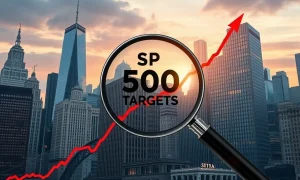Wall Street often relies on historical data and established patterns. However, a significant shift is now underway. A leading strategist recently stated, ‘Historical trends are no longer working.’ This bold claim highlights a growing concern. Increasingly, the actions of retail investors are baffling seasoned professionals. Their collective behavior is reshaping financial markets in unprecedented ways. This article explores how individual investors are challenging long-held assumptions and creating a new market paradigm.
Retail Investors Reshape Market Dynamics
The financial landscape has changed dramatically. Previously, large institutions dominated trading volumes. Now, individual retail investors hold significant sway. This shift is due to several factors. Easy access to trading platforms is one key element. Low commission fees also encourage participation. Furthermore, social media platforms provide new avenues for collaboration and information sharing. These changes empower a new generation of market participants. They often operate outside traditional analytical frameworks.
Historically, market analysis focused on institutional flows. Experts tracked hedge fund positions and mutual fund movements. These data points provided clear insights. Yet, the rise of the individual investor complicates this picture. Their motivations can differ greatly from institutional players. Consequently, old models struggle to predict market shifts. This creates a challenging environment for conventional strategies. Wall Street must adapt to these evolving dynamics. Ignoring them is no longer an option.
The Disconnect: Why Traditional Models Fail
Traditional financial models depend on predictable patterns. They assume rational behavior from all market participants. However, retail investors often exhibit different behaviors. Their decisions can be influenced by online communities. They might also react to news very quickly. This rapid collective action can trigger unexpected price movements. Such volatility challenges established valuation methods. It also makes risk assessment more complex.
Consider the recent phenomenon of ‘meme stocks.’ These assets often experience rapid price surges. Their value is not always tied to fundamental analysis. Instead, social media buzz drives much of their movement. This creates a disconnect. Wall Street strategists struggle to explain these events. Their quantitative models simply do not account for such dynamics. Therefore, understanding this new market psychology becomes crucial. It requires a different approach to analysis.
The Power of the Crowd: Social Media and Information Flow
Social media platforms have revolutionized market participation. Communities like Reddit’s WallStreetBets facilitate rapid information exchange. Individual investors share research, opinions, and trading ideas. This collective intelligence can move markets. It allows for coordinated buying or selling pressure. This phenomenon was rarely seen before the digital age. Now, it is a significant market force.
Moreover, information spreads instantly. News travels faster than ever. This speed can amplify market reactions. A single post or trending topic can ignite a frenzy. This is particularly true for smaller, less liquid stocks. The rapid flow of information democratizes access. It empowers individual investors to act quickly. This new environment challenges the information advantage previously held by institutions.
Here are key impacts of social media on retail investors:
- Rapid Information Sharing: News and analysis spread instantly among large groups.
- Community Building: Investors form online groups, fostering collective action.
- Sentiment Amplification: Positive or negative sentiment can quickly become viral.
- Democratized Access: Ordinary people gain access to discussions once limited to professionals.
Understanding New Investor Behaviors
The motivations of retail investors are diverse. Some seek quick profits from volatile assets. Others aim to challenge large hedge funds through short squeezes. This latter motivation gained prominence during specific market events. It represents a shift from purely profit-driven motives. Instead, a sense of collective purpose or even rebellion can play a role. This complicates traditional economic theories of investor behavior.
Furthermore, many individual investors are long-term holders. They might invest in companies they believe in. Their patience can surprise institutional traders. These investors often buy and hold through significant price swings. This resilience can frustrate short sellers. It also makes market corrections less predictable. Understanding these varied motivations is essential. It helps explain current market anomalies. Wall Street must expand its view beyond traditional financial incentives.
Implications for Institutional Investors and Wall Street
The rise of retail investors poses significant challenges for institutions. Their traditional models need updating. Risk management strategies also require re-evaluation. Large funds must now account for unpredictable retail-driven volatility. This means diversifying data sources. It also involves monitoring social media sentiment. Adapting to this new reality is crucial for survival.
Some institutions are already making changes. They are hiring data scientists specializing in alternative data. This includes social media analytics. Others are developing new algorithms. These tools aim to track retail sentiment and trading patterns. However, the learning curve is steep. The speed and unpredictability of retail-driven movements remain a hurdle. This ongoing adaptation reflects a fundamental shift in market power.
Navigating the Evolving Landscape
Both institutional and retail investors must adapt. For institutions, this means embracing new analytical tools. They need to understand the psychology of online communities. Collaboration with fintech firms might also prove beneficial. This can help them gain insights into individual investor behavior. Diversifying investment strategies is also wise. Relying solely on historical trends is now risky.
For individual investors, caution remains important. The market can be highly volatile. Following online trends carries risks. Due diligence is always advisable. Understanding personal risk tolerance is crucial. Education about market fundamentals also helps. The new market landscape offers opportunities. However, it also presents new challenges. Both sides must navigate this evolving environment carefully.
The Future of Financial Markets: A New Paradigm
The market is clearly in a transitional phase. The influence of retail investors is undeniable. This shift is not a temporary anomaly. It represents a fundamental change in market structure. Traditional market trends may never fully regain their old predictive power. Instead, a hybrid model might emerge. This model would integrate both institutional and individual investor insights. The future market will likely be more decentralized. It will also be more responsive to collective sentiment. This new paradigm demands flexibility and innovation from all participants.
Wall Street must move beyond its traditional frameworks. Embracing new data sources is vital. Understanding the motivations of a diverse investor base is also key. The market is no longer solely about algorithms and balance sheets. It also involves human psychology and collective action. This evolving dynamic presents both challenges and opportunities. Those who adapt will thrive in this new era of investing.
Conclusion: Adapting to the Unpredictable
The strategist’s words resonate deeply. ‘Historical trends are no longer working.’ This statement encapsulates the current market reality. Retail investors have indeed baffled Wall Street. Their collective power and unique behaviors have disrupted established norms. This disruption forces a re-evaluation of how markets function. It also highlights the need for continuous learning. The financial world is entering a new chapter. In this new chapter, adaptability is paramount. Both large institutions and individual traders must embrace change to succeed.
Frequently Asked Questions (FAQs)
Q1: Why are historical market trends no longer working?
A1: Historical market trends relied on predictable patterns and institutional dominance. The rise of retail investors, empowered by easy access to trading and social media, introduces new, often unpredictable behaviors. Their collective actions can defy traditional valuation models and fundamental analysis, leading to unexpected market movements that old trends cannot explain.
Q2: How do retail investors baffle Wall Street strategists?
A2: Retail investors baffle strategists through their collective action, rapid response to social media sentiment, and motivations that extend beyond pure profit, such as challenging established institutions or supporting specific companies. These behaviors do not fit neatly into traditional quantitative models, making market prediction and risk assessment more challenging for Wall Street.
Q3: What role does social media play in this market shift?
A3: Social media platforms like Reddit and Twitter play a crucial role. They facilitate rapid information sharing, community building among individual investors, and the amplification of market sentiment. This allows for coordinated buying or selling pressure, leading to phenomena like ‘meme stock’ surges that are driven by collective enthusiasm rather than traditional fundamentals.
Q4: What are the implications for institutional investors?
A4: For institutional investors, the implications include the need to update traditional models, re-evaluate risk management strategies, and integrate new data sources like social media analytics. They must adapt to higher volatility driven by retail movements and consider the psychological factors influencing individual investors to remain competitive and manage risk effectively.
Q5: How can individual investors navigate this evolving market?
A5: Individual investors should exercise caution and conduct thorough due diligence. While opportunities exist, the market can be highly volatile. Understanding personal risk tolerance, diversifying investments, and continuing to educate oneself about market fundamentals are crucial for navigating this dynamic and unpredictable landscape successfully.
























